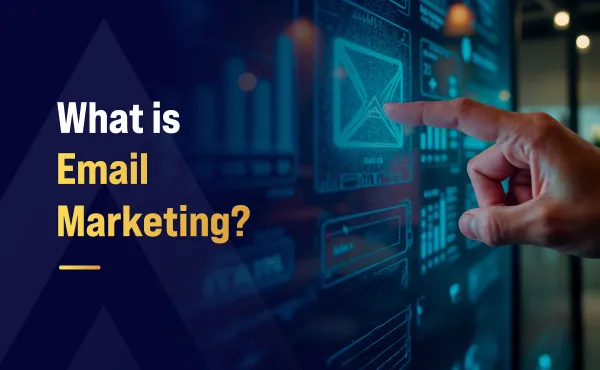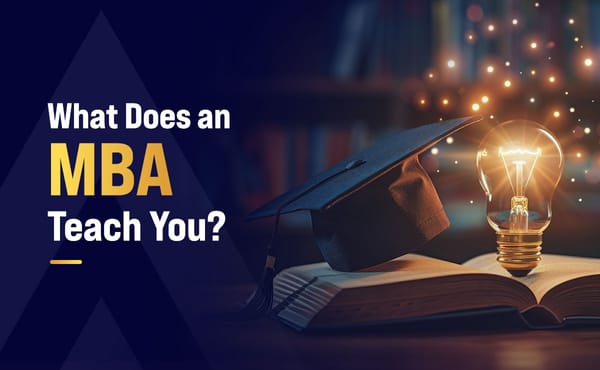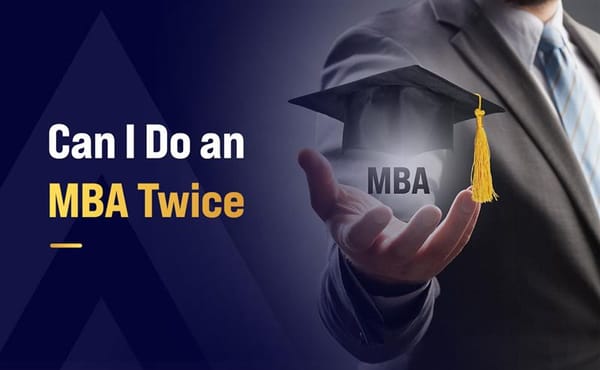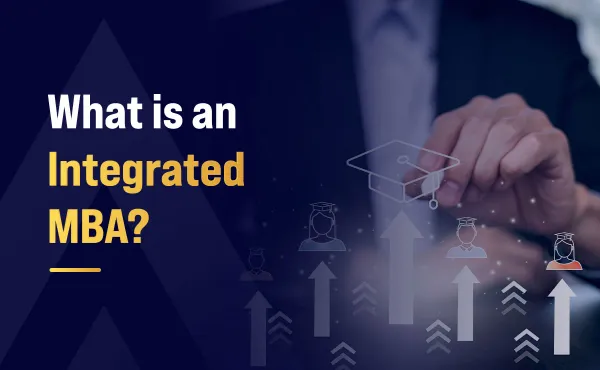Traditional Education vs Modern Education in 2025
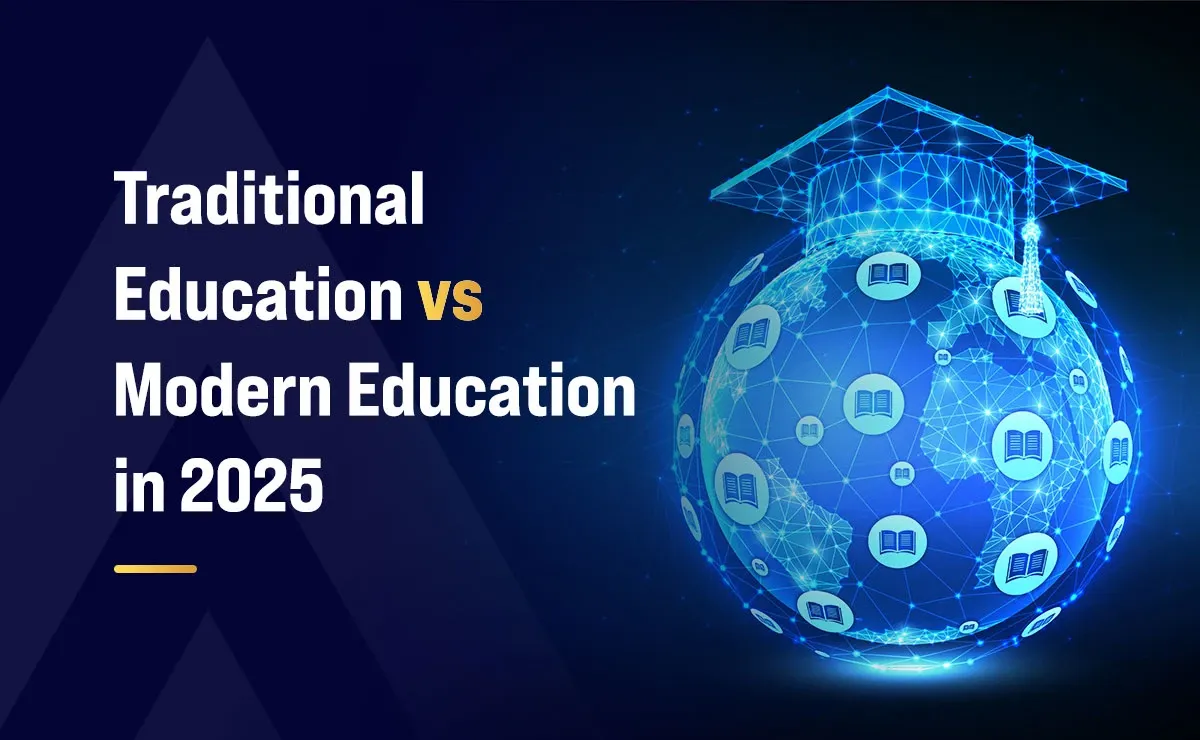
Modern-day society is based on education. It brings about a superior future for both people and society. There is dynamism in how teaching and learning are conducted. Therefore, the debate between traditional and modern education continues to this day. This is particularly so among teachers, policymakers, parents, and future students.
The modern and traditional education systems show differences in instructional processes, technology, and societal expectations. We have to understand these changes as we move into 2024. This paper addresses some of the major factors that influence successful educational practice in the future.
We’ll unpack the key concepts here, but if you’re curious about how we apply this thinking in real learning environments—beyond theory and into everyday student life—our homepage gives you a closer look. It’s where we break down our learning method, our programs, and how we’re helping young minds build clarity, confidence, and curiosity—step by step.
What is Traditional Education?
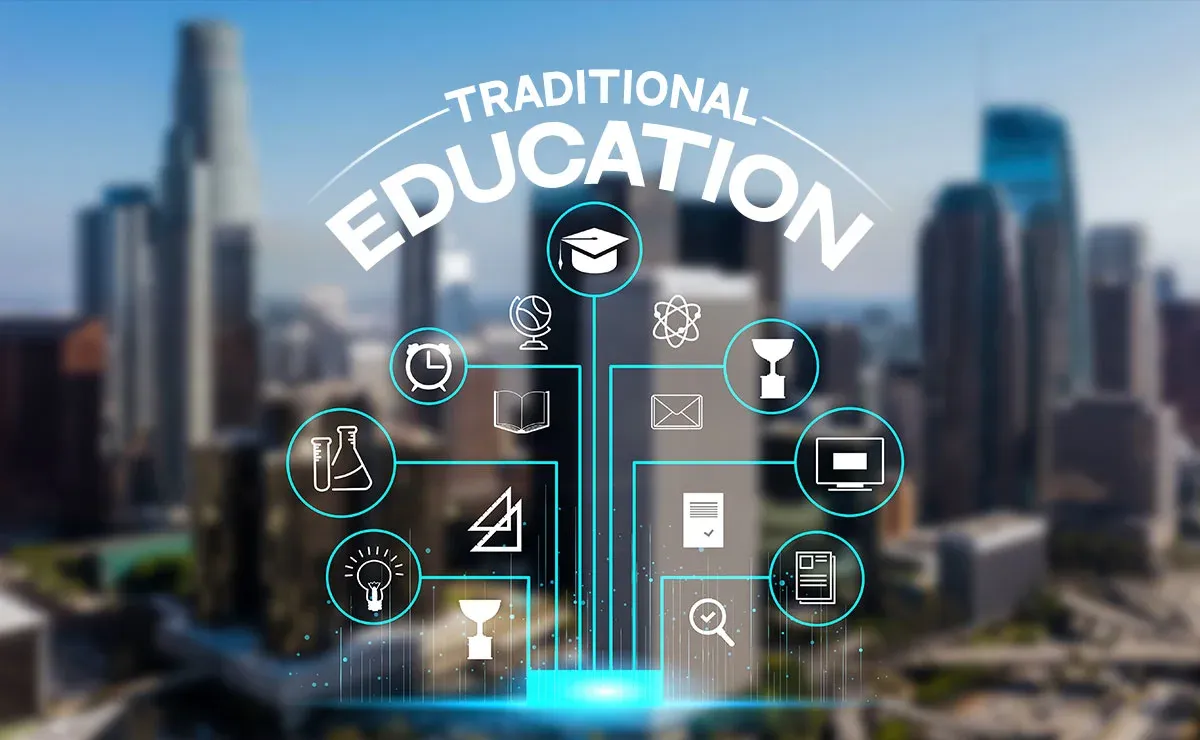
Traditional education is a long-standing teaching style. It emphasizes rote learning, discipline, and the transmission of cultural values. A structured classroom environment and a teacher-centered approach characterize it.
The curriculum is mostly fixed and integrates standardized assessments for reviewing performance. The emphasis is on solidifying foundations in fundamental areas.
This system has been effective historically in developing disciplined, educated citizens. But it is now criticized for its lack of flexibility and inability to adjust to learner-specific requirements.

What is Modern Education?
Modern education is shifting towards more student-centered, adaptive learning methods. It emerged in the 18th and 19th centuries but finally gained momentum in the 21st century. Educational reformers like Rousseau and Pestalozzi are known for laying the groundwork for modern educational principles.
Technology rightfully plays a crucial role in modern educational endeavors. It is also led by collaborative learning and tailored education. This helps fulfill the diverse needs, abilities, and interests of each student.
Subjects like Science, Technology, Engineering, and Mathematics (STEM) take center stage. Students engage in project-based learning, practical skill application, interactive activities, and real-world problem solving.
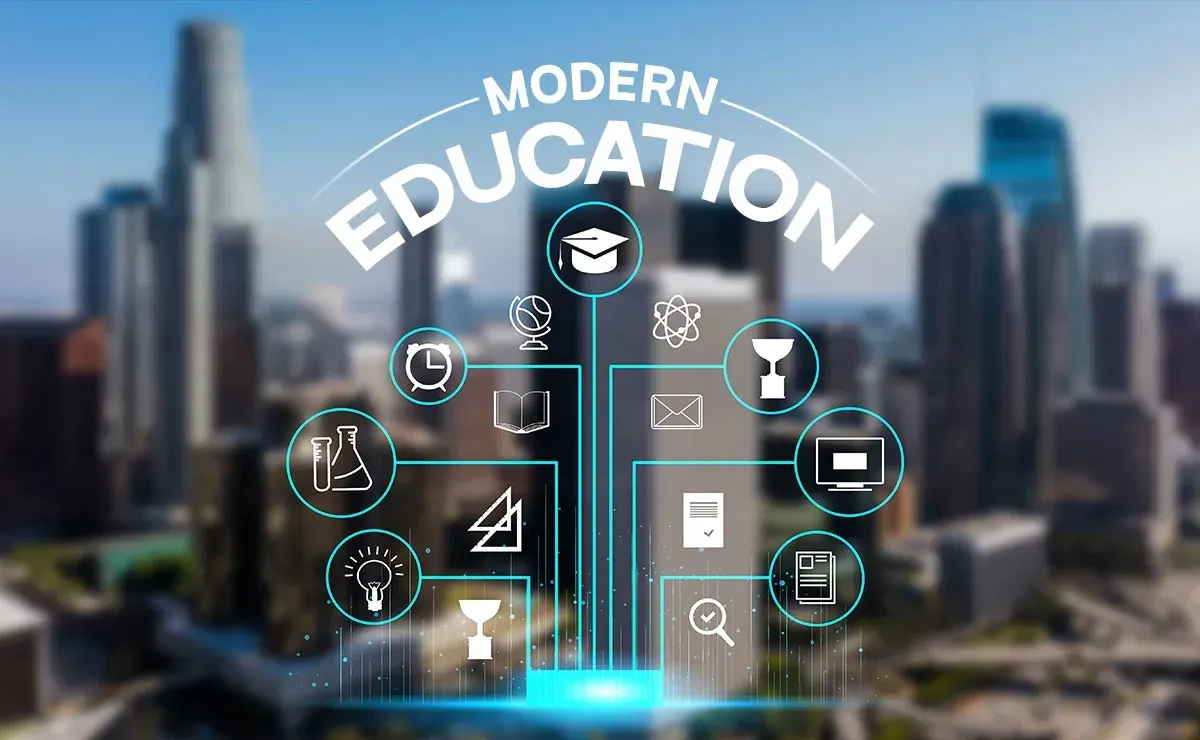
Traditional Education Vs. Modern Education System
To get a closer look at the differences between the two, let's focus on the larger changes in cultural values and expectations for schooling in 2024.
Structure and Methodology
In the conventional education system, students are exposed to the memorization pedagogy. The important ones are repetition, knowledge transfer, and social values. Oral and written testing are very prevalent in this case. It is more focused on passive and rote education.
The modern educational paradigm is known for its focus on skills required in today's changing world. It emphasizes conceptualization, versatility, innovation, and digital competence. It goes beyond traditional textbooks, making the learning process more engaging and flexible for learners.
Teaching Techniques and Tools
In a traditional education system, teachers are seen as the primary source of knowledge providers and authority. Students typically follow an outlined curriculum taught as a one-way transfer of knowledge. It also has limited access to resources and tools necessary to build practical skills.
Contrastingly, the modern educational system takes a student-centric approach. It creates an experiential learning environment by integrating modern tools and technologies. Incorporating digital tools and multimedia content into classrooms helps students access a wealth of information and learning materials.
Curriculum
Traditional education focuses only on subject-specific knowledge in its curriculum. It puts a special emphasis on theoretical subjects. Learners are routinely evaluated using standardized testing, and curriculum updates are a lengthy process. This is a serious concern as students are learning from an out-of-date curriculum that is incompatible with current industry standards.
Modern education provides a more adaptable curriculum. It fosters real-world applications of skills through project-based learning, internships, and collaboration with businesses. They prepare students for modern-day challenges while nurturing innovation at its core. As a result, the curriculum is changed more regularly to meet the talent demand of the current industry.
Knowledge Imparted
Traditional systems are based primarily on a fixed curriculum and pedagogy. Moreover, the flexibility of interdisciplinary studies or any other skills that are not academic is minimized.
In contrast, the education of the modern world is more dynamic, critical, and adaptable. It encompasses a wide range of study areas, including science, technology, engineering, mathematics, social sciences, and vocational skills. The objective is to provide students with the life skills and competencies they will require in the future.
Benefits
Traditional education:
- It is the way that maintains continuity of knowledge and moral teachings that have developed societies over generations.
- It has a well-developed curriculum that provides learners with clear, structured direction.
- The traditional systems with a teacher-centered approach promote discipline and focus. This helps nurture respect for acquiring knowledge and fosters a sense of responsibility toward studying.
Modern Education:
- The curriculum in modern education is more flexible.
- Modern education highlights intellectual reasoning. It encourages learners to better evaluate, analyze, and integrate insight.
- It incorporates up-to-date knowledge in areas such as technology, digital literacy, and interdisciplinary studies, making it more responsive to today’s workforce's needs.
- It adopts a student-centered methodology. This facilitates interaction, teamwork, and autodidacticism.
Drawbacks
Traditional education:
- The value of analytical skills and problem-solving is not taken seriously because of the nature of traditional education.
- It has a rigid curriculum. This makes it less adaptable to individual learning styles or contemporary challenges.
- This system is also slower to incorporate new developments in tools and technology.
- Traditional education has a top-down approach. This means that students often take a passive role in their learning.
Modern Education:
- While technology plays a central role in modern education, not all students have equal access to it. This increases the gap between individuals who can and cannot use digital tools.
- The heavy emphasis on skill development over foundational knowledge leads to gaps in foundational knowledge. It may also lead to students possessing fragmented knowledge in multiple areas.
- Modern education emphasizes constant adaptation and tech updates. This can lead to burnout, as it prioritizes novelty over mastery.
The Altera Institute's Take on Modern Education
Altera Institute is a specialist institute for brand, growth, and product careers and offers a 1-year full-time Post Graduate Program in Applied Marketing. It is an industry-backed institute founded by former leaders of Hindustan Unilever Limited (HUL).
Altera Institute offers some of India’s most industry-relevant marketing programs. Leading companies like HUL, Amazon, Nestle, Himalaya, Publicis Group, and many others use Altera's programs to upskill their employees.
Altera’s PGP in Applied Marketing has three unique elements:
- 100% Industry-Designed Curriculum: The curriculum is developed by industry experts from India’s leading organizations, including Amazon, HUL, Flipkart, WPP Group, Nestle, and many others.
- 100% Industry Mentor Taught: The courses and sprints at Altera Institute are 100% taught by industry-experienced professionals. Most of the mentors are former leaders in brands, sales, eCommerce, and product functions at India’s leading companies.
- Industry Backed: Altera Institute has its roots in the industry. The PGP is designed to address a significant gap in the industry's skill requirements for brand, growth, and product-related roles. Some of India’s leading companies, like Hindustan Unilever Limited, Mamaearth, and Mullen Lowe Lintas Group, have backed the program.
Altera Institute’s PGP in Applied Marketing is a perfect example of the intricacies and benefits of the modern education system. It has a limited intake of 150 students only for its class of 2027.
To learn more about Altera Institute and the PGP in Applied Marketing, visit our official web page.
Latest Innovative Teaching Methods
Value-Based Approach
The integration of a value-based approach represents a synthesis between traditional and modern education systems. This approach emphasizes academic excellence. It also focuses on ethical principles such as empathy, integrity, and global awareness.
Educational theories like constructivism and social learning support this model. It shows the importance of ethical decision-making and critical thinking. This develops proficiency in individuals. They are academically well-rounded, possess the necessary skills, and are socially responsible.
Student Centric Focus
Students have different individual needs, interests, and learning styles. As a result, they gain more from a personalized learning experience. A student-centered methodology promotes enthusiasm among students. This makes them take ownership of their educational prowess.
The approach focuses on building confidence and keeps students motivated to learn at their own pace. It equips students with practical skills, such as adaptability, self-directed learning, long-term retention, and real-world problem-solving.
Learn By Doing
Experiential learning involves hands-on activities that are essential to creating an experience for students. It leaves behind passive learning. Rather, it engages students in practical use to support theoretical knowledge.
Key aspects of the learn-by-doing methodology are group projects, collaborations, and peer-to-peer learning. It promotes creativity and critical thinking. This helps students acquire viable problem-solving skills that reflect current workplace conditions.
Integrating Technology
In today's environment, integrating technology into education is no longer considered a luxury. It is a hard necessity that contributes to the overall quality of knowledge and skills taught to students. Which aspect of technology is crucial for personalized learning experiences?
Well, the ability to provide a wide range of interactive tools, including simulations, games, and live projects, is key. This makes learning interesting, highly personalized, and enjoyable for students.
Technology provides access to educational content at any time from any location. Internet platforms and mobile devices greatly help with this endeavor. The modern workplace is increasingly tech-driven. As a result, having early access to technology helps them prepare for their future career endeavors.
Industry Relevance
The traditional education system falls short of meeting modern employability requirements. As a result, reevaluating and aligning the curriculum with industry needs has become paramount. It ensures that students learn the skills they can apply directly in their jobs.
Relevant teaching in the industry draws on the latest trends, technologies, and practices. It provides students with a competitive advantage by focusing on practical education through internships, mentorships, and real-world programs. Such students are also highly flexible in responding to changing industry needs.
Continuous Evaluation
Modern teaching methods should transcend the high stakes of traditional examinations. Instead, there are other balanced assessment techniques to evaluate student performance. They include project-based examinations, presentations, peer reviews, problem-solving exercises, self-evaluations, group projects, and much more.
Modern education is based on continual feedback. This will keep the students motivated and engaged and help them identify areas where they can continue to develop. Therefore, it is a personalized kind of education among students. It helps them to revisit what they have been exposed to in their academic life and improve their abilities as they go.
FAQ
Q1. Which one is more effective, traditional education or modern education?
Ans: Modern education focuses on critical thinking, practical skills, and adaptability to current technological advancements. Hence, it is considered more effective. It is known for a personalized learning environment. This promotes creativity and prepares students for real-world challenges.
Traditional education, in turn, tends to be obsolete. Its systematic treatment and focus on underlying knowledge may, however, be helpful. Therefore, the two should be integrated in a well-balanced way to provide a multi-faceted learning experience.
Q2. What is the importance of modern education?
Ans: Modern education is essential for developing specialist skills. It focuses on problem-solving abilities and flexibility in adapting to changing business requirements. Furthermore, it provides students with relevant and technologically advanced knowledge.
Their approach is more relevant to today's global concerns, emphasizing skills like critical thinking and interdisciplinary learning. This prepares them for dynamic, specialized careers in the future.
Q3. How does the use of technology differ in modern education vs. traditional education systems?
Ans. Traditional education places less dependence on technology. It lays more emphasis on rote learning and teacher-centered instruction. In contrast, modern education uses digital technologies, interactive platforms, and online materials to improve learning. This makes it more applicable to today's needs while remaining engaging and accessible.
Q4. Is it possible to integrate the traditional and modern education systems?
Ans: Yes, traditional and modern education can be merged. The strengths of traditional approaches, along with the adaptability and creativity of modern ones, are the most appropriate steps to take. This hybrid type helps promote balanced learning. It encourages cultural values as well as technological competence.
Summing Up
The traditional vs. modern education debate continues to shape the future of learning. Conventional education has preserved cultural values and discipline. Contemporary education, however, allows flexibility, critical thinking, and integration of technology.
Hence, good education should always be a combination of the qualities of both systems. It encourages a balanced approach that values basic knowledge while equipping students to face contemporary issues.
Such an education system may very well develop well-rounded, future-ready individuals. By including personalized learning, hands-on experiences, industrial relevance, and ongoing assessment, the education system can be transformed for a better future.


